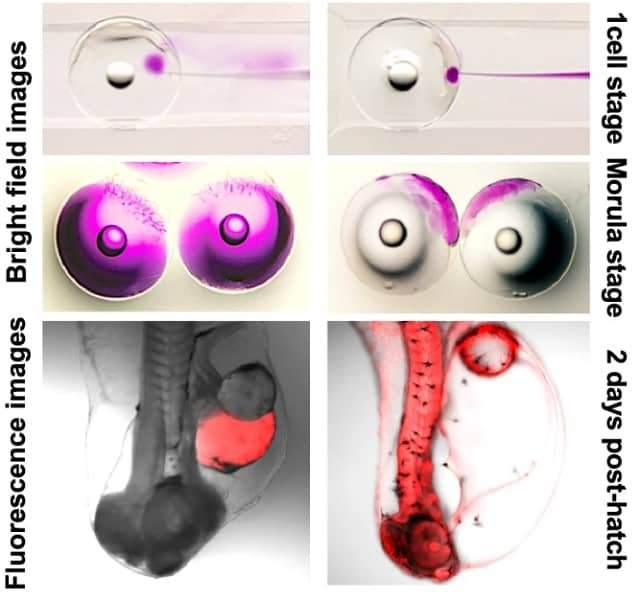
Genome editing is a technology that can remarkably accelerate the domestication of different aquaculture species through the artificial induction of desired traits with high precision.
Researchers from Kyushu University, the Fisheries Research and Education Agency (FRA), the University of Miyazaki, and Hiroshima University developed a variety of Pacific mackerel or starling mackerel (Scomber japonicus) with reduced cannibalism behavior and an efficient egg collection, a system with high reproducibility that uses the stable microinjection method.
The researchers first developed a platform for mackerel starling genome editing, followed by the development of a V1a2 knockout line.
Genome editing and domestication of aquaculture species
The production of new aquaculture species requires an enormous amount of time, as well as specific breeding facilities for a particular fish species, as well as an enormous amount of man-hours and funds.
Genome editing technology has attracted worldwide attention for its ability to artificially induce the desired trait with high accuracy and speed up reproduction.
Genome editing has already been applied to the breeding of fish such as common carp (Cyprinus carpio), channel catfish (Ictalurus punctatus), and red bream, with increased muscle mass resulting from myostatin gene editing that regulates muscle development.
Pacific mackerel (Scomber japonicus)
The Pacific mackerel or starling mackerel (Scomber japonicus) is a fish that inhabits temperate and subtropical regions of the world and is an economically important species in Japan.
In recent years, starling mackerel aquaculture has been promoted in various parts of Japan.
One problem with full-cycle aquaculture of mackerel is the low survival rate of fingerlings mainly due to aggressive behavior and even cannibalism at the fingerling stage.
Stay Always Informed
Join our communities to instantly receive the most important news, reports, and analysis from the aquaculture industry.
Pacific mackerel fingerlings become intensely cannibalistic about 14 days after hatching, and with usual breeding techniques only about 10% survive immediately after hatching until they reach a body length of about 10 cm.
Pacific mackerel genome editing
“For genome editing to be performed efficiently in fish, it is necessary to microinject a genome editing reagent into fertilized eggs immediately after fertilization,” the researchers report.
They also indicate that the experimental mackerel genome editing system established in the study ensures that homogeneous samples are obtained at a date and time that is convenient for the experimenter.
“Injection manipulation should be performed during early embryogenesis, primarily in 1-celled ova shortly after spawning and fertilization or, at the latest, in 2-celled ova after first cleavage,” they report.
They also highlight that in order to efficiently establish genetically modified animals through genome editing, the selection of individuals with the desired genotype and their reproduction through generations are essential.
Conclusion
“In this study, an experimental system was developed that allows efficient egg collection and genome editing of Pacific mackerel”; conclude.
They also highlight that the mackerel fingerlings, whose genome was edited in V1a2, had half the cannibalistic behavior of the wild type.
“Breeding (mackerel) with more docile traits would be extremely beneficial for domestication and efficient production of new aquaculture species”; they concluded.
Contact
Michiya Matsuyama
ABRIC, Faculty of Agriculture,
Kyushu University,
Fukuoka, 819-0395, Japan
Email: rinya_m@agr.kyushu-u.ac.jp
Reference (open access)
Ohga, H., Shibata, K., Sakanoue, R. et al. Development of a chub mackerel with less-aggressive fry stage by genome editing of arginine vasotocin receptor V1a2. Sci Rep 13, 3190 (2023). https://doi.org/10.1038/s41598-023-30259-x
Editor at the digital magazine AquaHoy. He holds a degree in Aquaculture Biology from the National University of Santa (UNS) and a Master’s degree in Science and Innovation Management from the Polytechnic University of Valencia, with postgraduate diplomas in Business Innovation and Innovation Management. He possesses extensive experience in the aquaculture and fisheries sector, having led the Fisheries Innovation Unit of the National Program for Innovation in Fisheries and Aquaculture (PNIPA). He has served as a senior consultant in technology watch, an innovation project formulator and advisor, and a lecturer at UNS. He is a member of the Peruvian College of Biologists and was recognized by the World Aquaculture Society (WAS) in 2016 for his contribution to aquaculture.




